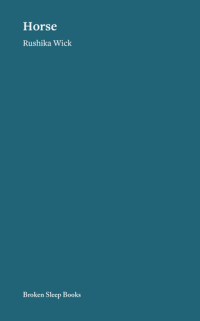Reading Horse: Thoughts on the Digital Humanities in Rushika Wick's Newest Book
 Horse is only one letter different from house. A horse is ours and hours where a house is only yours or belonging to you all. It is not only the size, but the material requirements that make horses so expensive; they need to live in a complex ecosystem to thrive. Meanwhile, the ecological nightmare is this disturbed and disappearing mare impossible to touch by means of technology.
Horse is only one letter different from house. A horse is ours and hours where a house is only yours or belonging to you all. It is not only the size, but the material requirements that make horses so expensive; they need to live in a complex ecosystem to thrive. Meanwhile, the ecological nightmare is this disturbed and disappearing mare impossible to touch by means of technology.






